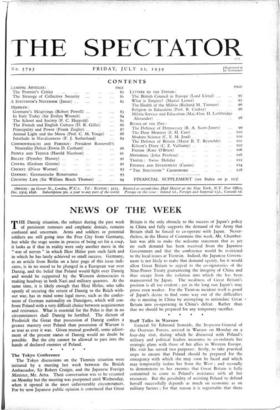The Tokyo Conference The Tokyo discussions on the Tientsin situation
were initiated by a meeting last week between the British Ambassador, Sir Robert Craigie, and the Japanese Foreign Minister, Mr. Arita. Their conversation was to be resumed on Monday but the meeting was postponed until Wednesday, when it opened in the most unfavourable circumstances. For by now Japanese public opinion is convinced that Great Britain is the only obstacle to the success of Japan's policy in China and fully supports the demand of the Army that Britain shall be forced to co-operate with Japan. Never- theless, in the House of Commons this week, Mr. Chamber- lain was able to make the welcome statement that as yet no such demand has been received from the Japanese Government and that the conference would be restricted to the local issues at Tientsin. Indeed, the Japanese Govern- ment is not likely to make that demand openly, for it would allow Great Britain to appeal to the co-signatories of the Nine-Power Treaty guaranteeing the integrity of China and thus escape from the isolation into which she has been manoeuvred by Japan. The weakness of Great Britain's position is all too evident ; yet in the long run Japan's may prove even weaker. For the Tientsin incident itself is proof of Japan's desire to find some way out of the difficulties she is meeting in China by attempting to intimidate Great • Britain into co-operating in China's defeat. Rather than that we should be prepared for any temporary sacrifice.






















































